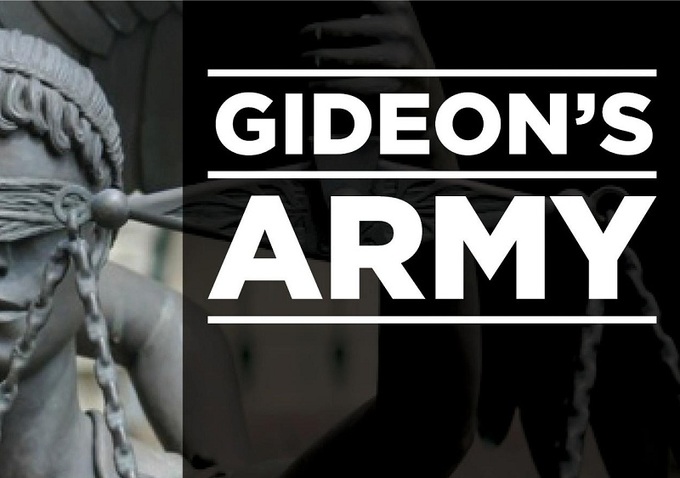The following is a review of the documentary film Gideon’s Army which airs July 1st on HBO.
Twelve million people were charged with a crime in 2011. Most of them were represented by one of the nation’s 15,000 public defenders. Those defenders carry impossible caseloads, sometimes hundreds of clients at a time. Many are overwhelmed, by the volume of work, the low pay, and the emotional strain. Some give up, and quit their jobs. Some give up and don’t quit, and their clients pay the price. Others, the ones featured in Gideon’s Army, fight each case to the wall.
Gideon’s Army, airing Monday, July 1st on HBO, is a documentary portrait of three young public defenders, all doggedly fighting the good fight, or the best fight they can. It’s also a portrait of a court system in crisis, and an expose of how far we are from American ideals of justice.
The movie trails Brandy Alexander, June Hardwick and Travis Williams, all public defenders working in the deep South. We first meet Alexander, then 29 years old and in her third year as a public defender. She’s on the phone with a client’s mother, telling her that she has negotiated a place in pre-trial diversion program, but that he’s only eligible if he can make bail. He can’t, and pleads guilty. Between 90 and 95 percent of people charged with a crime plead guilty for something, as the film notes.
Filmmaker Dawn Porter focuses on one case for each attorney, tracing their efforts to mount a defense while struggling with their own exhaustion. Alexander is representing Demontes Wright, a high school student charged with robbing a pizza store. Branden Mullin, the young man represented by Travis Williams, is facing 10 years in prison for a $96 theft. Hardwick has a client already in prison, who has lost her house and job during her incarceration awaiting trial. All the clients are poor.
Poverty is the subtext of the film, in the defendants’ inability to make bail, to keep a house, and of course, to hire a private attorney. And you see the poverty of the lawyers themselves. One digs in her car seats for change to fill her gas tank; the $3 she scrounges has to last her four days, until her paycheck. Another finds herself unable to support her family on her defenders salary, and has to make a hard choice. Another squeaks by on $300 for gas, groceries, utilities and life, once the rent and student loans are paid.
Poor people are the people who go to prison in America, for the most part, and Gideon’s Army drives home the toll that incarceration takes on both the prisoner and their families. “I’ll never get used to people going to prison,” Travis Williams says at one point. I’ll never get used to that.” “I can’t fathom, I cannot fathom, turning around to his mother after a jury has said guilty and I’ve told her that he’s going to get ten years, at least. Minimum,” Alexander says. Porter shows the grief of families losing their children to the prison system, the grief of friends pitted against each other, and the grief of powerlessness in the face of a criminal charge.
If Law and Order or The Good Wife are your idea of the courts, Gideon’s Army will be a revelation. Most cases don’t go to trial. Most public lawyers are hanging on by their teeth, and that’s the ones giving it their all. Most don’t. Not everyone is innocent, and not all crimes are small. People do horrible things, sickening things, and the film shows that. One lawyer has a client whose actions are so nauseating that she wants to vomit as he’s describing them. Those people still deserve a lawyer, and they deserve better than the system affords them.
If you think about the courts a lot, as I do, Gideon’s Army serves a different purpose. It’s easy to see the courts as a system, and defendants in the aggregate. The film reminds you that the millions of cases public defenders take on each year involve individual people: teenagers accused of robbery, their parents trying to stay strong, young lawyers who desperately want to do right by their clients, at deep personal cost.
There’s a moment in the film when Congressman John Lewis, a veteran of the civil rights movement, meets Brandy Alexander. He thanks her for her service. We usually say that to members of the armed forces, not our public defenders. But Gideon’s Army makes clear that those lawyers are essential to the fundamental American notion of justice for all, and how far we remain from that promise.









